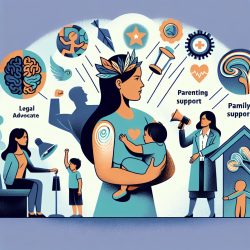Enhancing Practitioner Skills with Insights from Refugee and Migrant Youth Settlement Research

The integration of refugee and migrant youth into new societies presents unique challenges that require tailored support from practitioners. The research article, "Rebuilding life after migration: Research protocol of a mixed methods study on settlement experiences of refugee and migrant youth," offers valuable insights into the settlement experiences of young migrants and refugees. This blog will highlight key findings and provide practical recommendations for practitioners working with this population.
Key Findings from the Research
The study identifies several critical factors influencing the settlement and wellbeing of refugee and migrant youth:
- Pre- and Post-Migration Stressors: Youth often face significant stressors before and after migration, including trauma, family separation, and adaptation to new cultural environments.
- Family Dynamics: Intergenerational conflict and changes in family roles can exacerbate stress, particularly when parents and children acculturate at different rates.
- Mental Health Barriers: Cultural stigma, lack of knowledge about services, and mistrust of systems can prevent youth from seeking mental health support.
- Service Utilization: Many youth do not access available mental health and support services, often due to a lack of culturally responsive practices.
Practical Recommendations for Practitioners
Based on the study's findings, here are some strategies practitioners can implement to improve support for refugee and migrant youth:
1. Culturally Responsive Practices
Ensure that therapy and support services are culturally informed and sensitive to the unique backgrounds of refugee and migrant youth. This includes understanding cultural norms, values, and communication styles.
2. Family-Centered Approaches
Work with entire families to address intergenerational conflicts and support family cohesion. Providing family therapy can help bridge the acculturation gap between parents and children.
3. Trauma-Informed Care
Recognize the impact of pre-migration trauma and provide trauma-informed care. This involves creating a safe and supportive environment where youth feel understood and validated.
4. Outreach and Education
Conduct outreach to educate communities about available mental health services and reduce stigma. Collaborate with community leaders and use culturally appropriate materials to disseminate information.
5. Building Trust
Establish trust with youth and their families by demonstrating cultural competence and empathy. Be transparent about confidentiality and the therapeutic process to alleviate fears and concerns.
6. Collaboration with Schools
Partner with schools to identify and support youth who may be struggling with mental health issues. Schools can serve as a crucial point of contact for providing resources and referrals.
Encouraging Further Research
While the study provides valuable insights, further research is needed to explore the diverse experiences of refugee and migrant youth across different contexts. Practitioners are encouraged to engage in ongoing learning and contribute to research efforts to enhance the support provided to this population.
Conclusion
By implementing these strategies, practitioners can play a pivotal role in improving the settlement experiences and mental health outcomes of refugee and migrant youth. Embracing culturally responsive practices, supporting families, and fostering trust are essential steps toward creating a more inclusive and supportive environment for these young individuals.To read the original research paper, please follow this link:
Rebuilding life after migration: Research protocol of a mixed methods study on settlement experiences of refugee and migrant youth.
Citation: Ziaian, T., Puvimanasinghe, T., Miller, E., Augoustinos, M., Esterman, A., Baddeley, M., Arthur, N., de Anstiss, H., Tsoulis, E., Stewart-Jones, T., Ghassemi, E., & Pir, T. (2023). Rebuilding life after migration: Research protocol of a mixed methods study on settlement experiences of refugee and migrant youth. PLoS One. https://doi.org/10.1371/journal.pone.0285023










